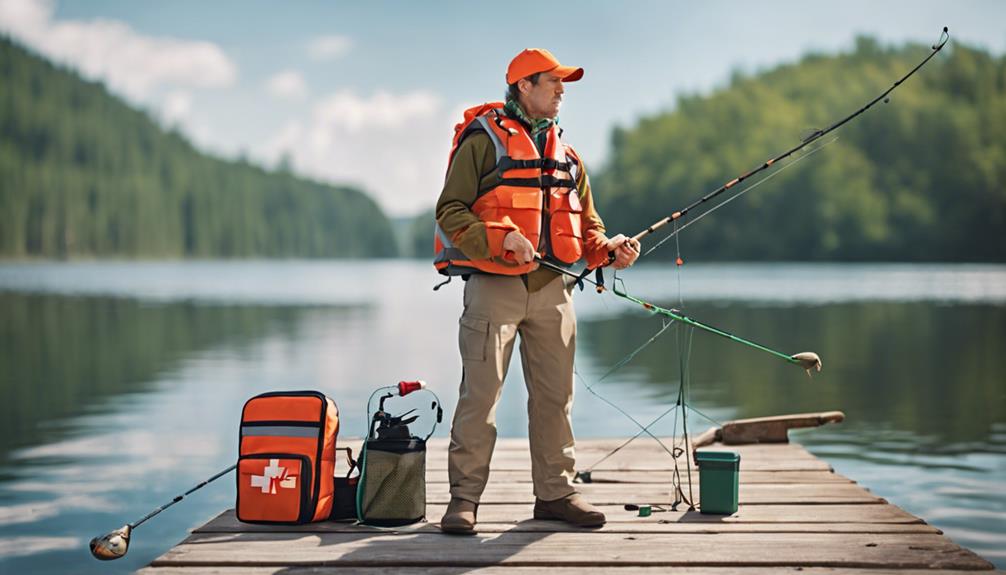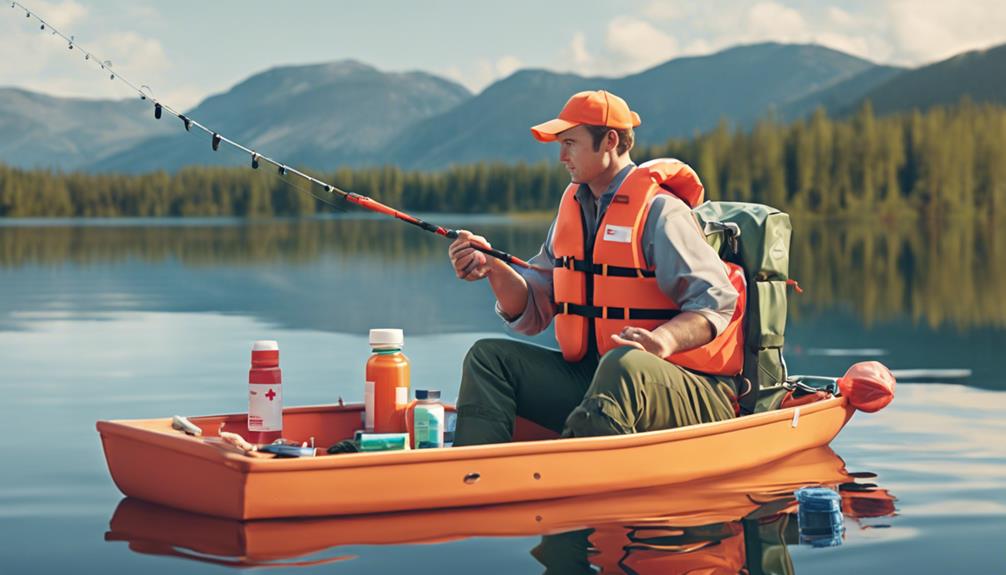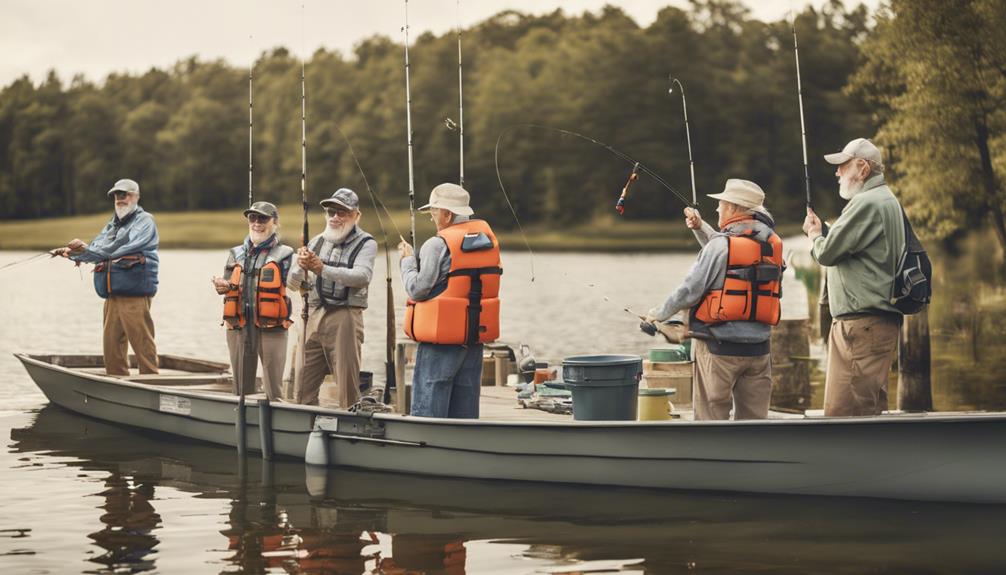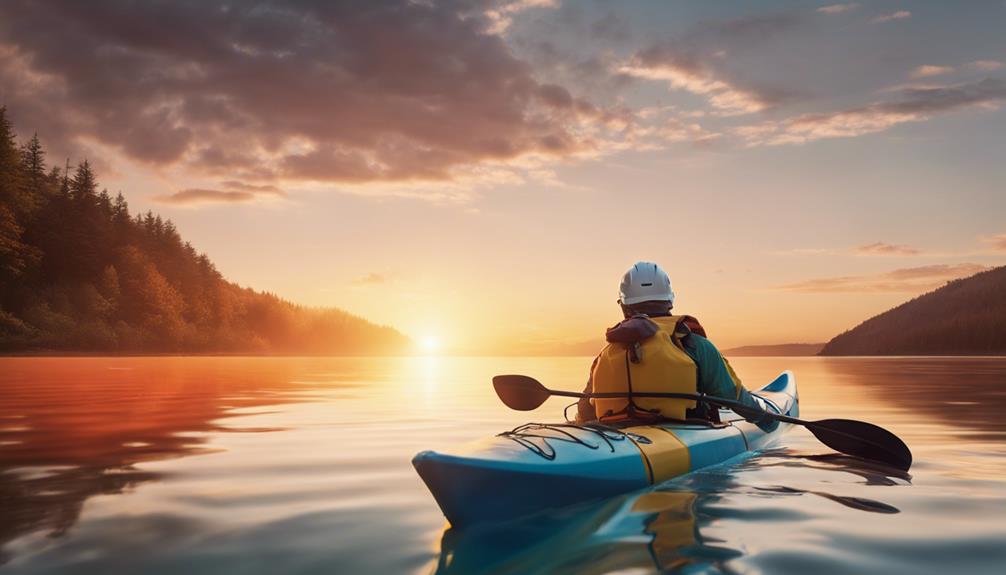Did you know that over 1000 fishing-related accidents occur annually in the United States?
Ensuring your safety while enjoying this popular pastime is paramount. Before you cast your line, it's crucial to be aware of the fundamental safety tips that can make a significant difference in your angling experience.
From proper gear selection to understanding water conditions, there are essential guidelines to follow that will not only keep you safe but also enhance your enjoyment of the sport.
Importance of Proper Gear
When gearing up for your fishing excursion, ensure you have the appropriate equipment to enhance your angling experience and stay safe. Proper gear maintenance is essential for a successful and enjoyable fishing trip. Before heading out, check your fishing rod for any damage and make sure the reel is functioning smoothly. Inspect your fishing line for any frays or knots that could weaken it during a catch. Taking the time to maintain your gear will prevent unexpected malfunctions that could potentially ruin your day on the water.
Skill development is another crucial aspect when it comes to the importance of proper gear. Having the right equipment is only half the battle; you must also hone your fishing skills to make the most out of your gear. Practice casting in different conditions to improve your accuracy and distance. Learn how to properly set the hook to secure your catch effectively. Understanding how to use your gear to its full potential won't only increase your chances of success but also make your fishing experience more rewarding.
Understanding Water Conditions
Inspect the water conditions before you start your fishing expedition to ensure a successful and safe angling experience. Understanding the water conditions is crucial for your safety while out on the water. Here are a few key points to keep in mind:
- Current safety: Be aware of the strength and direction of the currents in the water. Strong currents can make it challenging to navigate or maintain your position. Avoid fishing in areas with swift currents if you're a novice angler, as they can be dangerous.
- Water hazards: Look out for any potential water hazards such as rocks, submerged branches, or sudden drop-offs. These hazards can't only pose a risk to your safety but also affect your fishing experience. Stay alert and avoid casting near areas where hazards are present.
- Weather conditions: Check the weather forecast before heading out. Sudden changes in weather can impact water conditions and pose a safety risk. It's essential to be prepared for any weather-related challenges you might face while fishing.
Handling Fish Safely
Ensure your angling experience remains safe and enjoyable by mastering the art of handling fish safely. Safe handling of fish not only protects you but also ensures the fish's well-being. When handling fish, it's crucial to use proper techniques to minimize harm and increase their chances of survival after release.
One essential aspect of safe fish handling is wetting your hands before touching the fish. This helps maintain the fish's protective slime layer, which is vital for their health. Wet hands also prevent the fish's skin from drying out or getting damaged. When holding a fish, support its body properly to avoid injuring its internal organs. Cradling the fish gently with one hand supporting the head and the other the midsection is a good technique to prevent unnecessary stress.
If you need to unhook the fish, use a proper tool like long-nose pliers to safely remove the hook without causing harm. Avoid squeezing the fish or putting excessive pressure on its mouth or body. If the fish swallows the hook deeply, consider cutting the line close to the hook instead of trying to retrieve it, as this can cause more harm.
Weather Awareness and Preparation
To enhance your angling safety, prioritize staying informed about weather conditions and preparing accordingly. Weather forecasting plays a crucial role in ensuring a safe and enjoyable fishing experience. Be proactive in monitoring weather updates before heading out to the waters to avoid being caught off guard by sudden changes. In addition to keeping an eye on the forecast, familiarize yourself with emergency procedures to handle unexpected weather-related situations effectively.
- Check Weather Forecasts: Before embarking on your fishing trip, always check the weather forecasts for the specific location and time you plan to fish. Pay attention to any warnings or advisories that may affect your outing.
- Pack Appropriate Gear: Based on the weather predictions, pack suitable gear such as rain gear, extra clothing layers, sunscreen, and hats to protect yourself from potential weather fluctuations.
- Emergency Plan: Develop an emergency plan in case weather conditions deteriorate rapidly. Know how to safely return to shore or seek shelter if a storm approaches. Ensure you have a reliable means of communication in case of emergencies.
Fishing Buddy System
Strengthen your angling safety measures by partnering up with a fishing buddy when heading out on the waters for added security and assistance. The fishing buddy system is a fundamental safety protocol that enhances your overall safety while enjoying your fishing adventures. Having a companion with you not only provides emergency communication in case something goes wrong but also ensures there's someone to assist you in times of need.
When selecting a fishing buddy, choose someone reliable and experienced in fishing or water activities. It's essential to establish clear communication and safety protocols before setting out on your fishing trip. Make sure both you and your fishing buddy are aware of each other's capabilities, limitations, and emergency procedures. Having a fishing buddy by your side can offer peace of mind knowing that there's someone looking out for your well-being.
In the event of an emergency, your fishing buddy can assist in contacting authorities or providing first aid if needed. It's crucial to have a plan in place for various scenarios, such as getting separated, equipment failure, or medical emergencies. By working together with your fishing buddy and following safety guidelines, you can make your angling experience safer and more enjoyable.
First Aid Kit Essentials
Prepare your fishing first aid kit with essential supplies to address potential injuries or emergencies while out on the waters. It's crucial to be equipped with the necessary items to handle any unexpected situations that may arise during your fishing trip. Stocking supplies in your first aid kit can make a significant difference in providing timely emergency response when needed.
- Bandages: Include an assortment of bandages of different sizes to dress minor cuts, scrapes, or blisters that may occur while handling fishing equipment or moving around the fishing area.
- Antiseptic Wipes: Having antiseptic wipes in your kit can help clean wounds effectively to prevent infections. They're convenient and essential for maintaining proper wound hygiene in outdoor settings.
- Pain Relievers: In case of minor injuries or headaches, pain relievers such as ibuprofen or acetaminophen can provide temporary relief until further medical assistance is available.
Sun Protection Measures
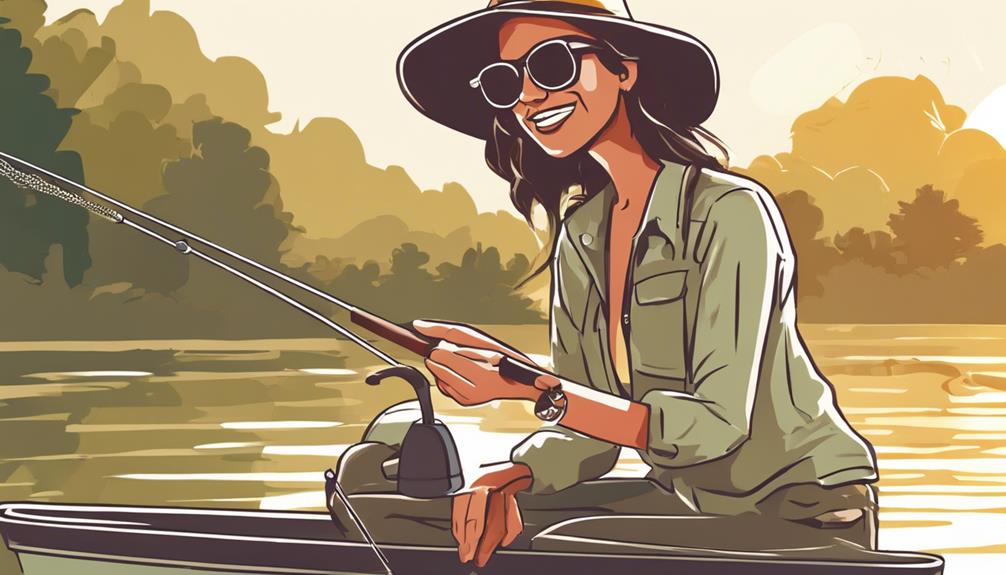
Shield your skin from harmful UV rays by applying sunscreen with a high SPF rating before going fishing. Sunscreen application is crucial to protect yourself from sunburn and reduce the risk of skin cancer. Remember to reapply sunscreen every few hours, especially if you're sweating or in the water. In addition to sunscreen, wearing protective clothing such as long-sleeved shirts, wide-brimmed hats, and UV-blocking sunglasses can further shield you from the sun's harmful rays.
While fishing, it's easy to get caught up in the excitement and forget about staying hydrated. Make sure to drink plenty of water throughout the day to prevent dehydration. Consider bringing a reusable water bottle to refill as needed. Additionally, schedule regular shade breaks to give your skin a rest from direct sunlight. Find a shady spot to relax, reapply sunscreen, and hydrate before returning to fishing.
Respect for Wildlife
Remember to always observe wildlife from a safe distance to avoid disturbing their natural habitats and behaviors. It's crucial to prioritize wildlife conservation and habitat preservation when enjoying outdoor activities like fishing. Here are some essential tips to help you show respect for wildlife:
- Maintain a Safe Distance: When observing wildlife, ensure you keep a safe distance to avoid causing stress or disruptions to their natural behaviors. This allows animals to carry on with their activities without feeling threatened.
- Dispose of Trash Properly: Properly dispose of any trash or waste to prevent harm to wildlife. Litter can have a detrimental impact on animals and their habitats, so always pack out what you pack in.
- Follow Wildlife Guidelines: Familiarize yourself with local wildlife guidelines and regulations. These rules are in place to protect both the animals and their habitats, ensuring they remain preserved for future generations to enjoy.
Frequently Asked Questions
Can Novice Anglers Fish in Any Body of Water, or Are There Specific Locations They Should Avoid?
When fishing as a novice angler, it's important to choose your locations wisely. Not all bodies of water are safe or suitable for fishing, especially if you're just starting out.
Always consider water conditions and follow fishing etiquette to ensure a safe and enjoyable experience. By picking the right spots and being aware of potential dangers, you can minimize risks and make the most of your angling adventures.
Are There Any Restrictions or Regulations for Novice Anglers to Be Aware of Before They Start Fishing?
Before you start fishing, it's crucial to be aware of fishing regulations and safety tips. Novice anglers should familiarize themselves with any restrictions or guidelines in their area. This could include rules about catch limits, equipment requirements, or protected species.
Understanding and following these regulations not only ensures your safety but also helps protect the environment and maintain the sustainability of fishing resources.
How Can Novice Anglers Determine if the Water They Are Fishing in Is Safe for Swimming or Wading?
Before heading out, assess water quality by looking for signs of pollution like dead fish or strange odors.
Safety measures include wearing appropriate footwear and avoiding areas with strong currents.
Conduct a risk assessment by identifying potential hazards such as slippery rocks or underwater obstacles.
Always prioritize safety when determining if the water is safe for swimming or wading to ensure a fun and worry-free fishing experience.
What Should Novice Anglers Do if They Encounter a Dangerous or Aggressive Fish While Fishing?
If you encounter a dangerous or aggressive fish while fishing, safety precautions are essential. Handling aggressive fish requires caution and quick thinking. Stay calm, avoid sudden movements, and slowly reel in your line.
Be prepared to release the fish if necessary. Always prioritize your safety and well-being in such situations. Remember to follow proper handling techniques to minimize the risk of injury.
Are There Any Special Precautions Novice Anglers Should Take When Fishing in Areas Known for Extreme Weather Conditions?
When fishing in areas with extreme weather, remember that weather preparedness is crucial. Always bring safety gear like a life jacket and wear appropriate clothing.
Stay informed about weather forecasts before heading out. Establish emergency response plans and communication protocols with your fishing companions.
Being proactive and prepared can help ensure a safer fishing experience in challenging weather conditions.
Conclusion
Remember, as a novice angler, following basic safety tips is crucial to ensure a successful and enjoyable fishing experience. From using proper gear and understanding water conditions to handling fish safely and being prepared for changing weather, taking precautions can make all the difference.
Always prioritize safety, whether you're out on a boat or fishing from shore. By being aware, prepared, and respectful of wildlife, you can make the most of your time on the water.
Happy fishing!
